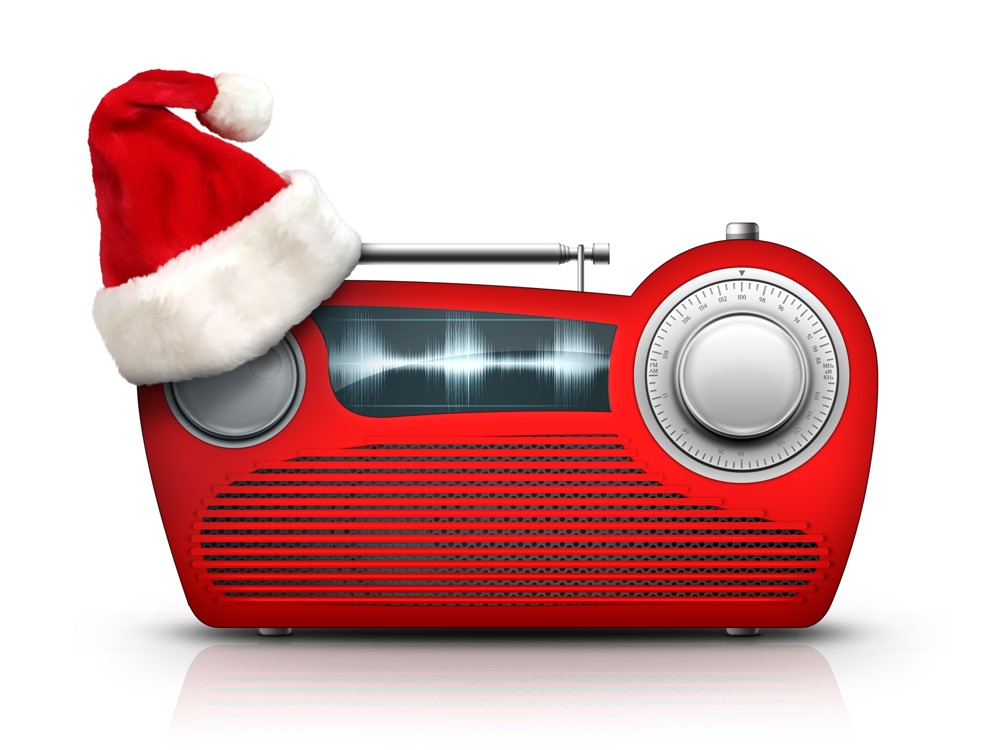
Now that we’re on the other side of Thanksgiving (hope you had a good weekend), it’s the race to the December holidays and the ushering in of a new year. Most of us are looking forward to 2021, waiting to turn the page on the Worst. Year. Ever.
But some radio stations are set to have a strong end of the year because they’ve already flipped to “holiday music.” Real people tell us they’d just as soon radio got past the Thanksgiving weekend before cuing up that Nat King Cole holiday classic.
The ratings always suggest otherwise. Early starters are usually rewarded, not to mention getting the jump on their in-town competitors.
This year, things might even be amplified. I wish I had a buck for every person who has confided that “Christmas music is going to do really well this year.”
Those bold prognostications are leveraged on the reality that 2020 has been an especially long, difficult slog, and many people just want to escape to the warmth and comfort of Christmas music.
It’s hard to argue with that logic, but this is not a new phenomenon. Flipping to “All Christmas Music” has been around for a long time. In fact, this 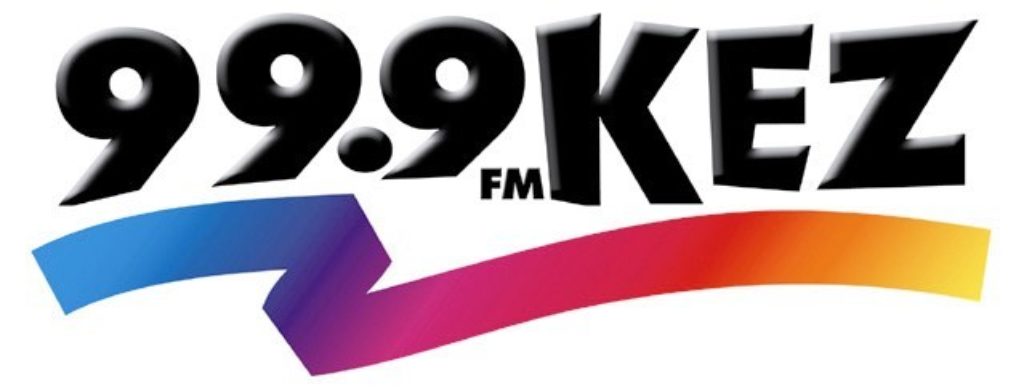 may be the 30th anniversary of this once-bold idea, probably first started by KEZ in Phoenix.
may be the 30th anniversary of this once-bold idea, probably first started by KEZ in Phoenix.
We highlighted the station – and the stunt – a few years back in the second installment of our “Radio’s Most Innovative” feature. Read about it here.
Going “All Christmas Music” actually hit an all-time ratings high – last year. And that was well before we were socially distancing, wearing face masks, and dealing with toilet paper shortages.
Nielsen ran the trended numbers for the 2019 Holiday Book, measuring a 90% gain (November ’19 to Holiday ’19) for AC stations that ran the stunt. As Nielsen VP, Audience Insights Jon Miller commented in Inside Radio at the time, “People are engaging even more with holiday music, particularly on the AC format. The appetite just seems to keep growing.”
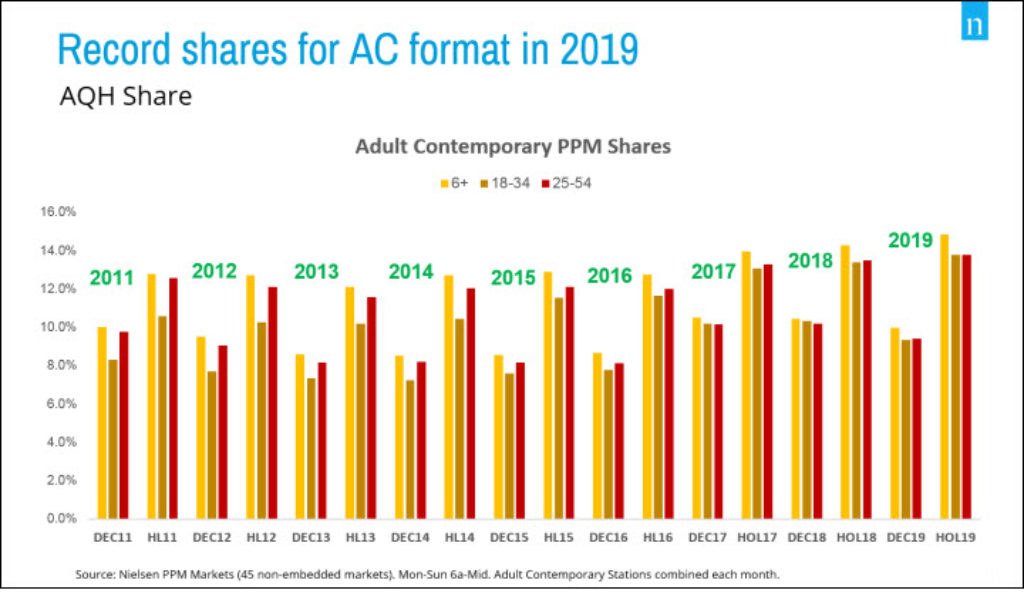 This uptrend was happening BEFORE the pandemic.
This uptrend was happening BEFORE the pandemic.
To get a sense for how things might shake out in the year of COVID, we included a question about holiday music in the last wave of our COVID study among commercial radio stations in North America. This survey was fielded in October. And while the numbers didn’t skyrocket, respondents told us there was a strong likelihood they’d tune in to Christmas music on the radio in 2020 as much if not a little more than last year.
And isn’t it fascinating that younger radio listeners are especially likely to be jonesing for Christmas music, along with Blacks and Latinos.
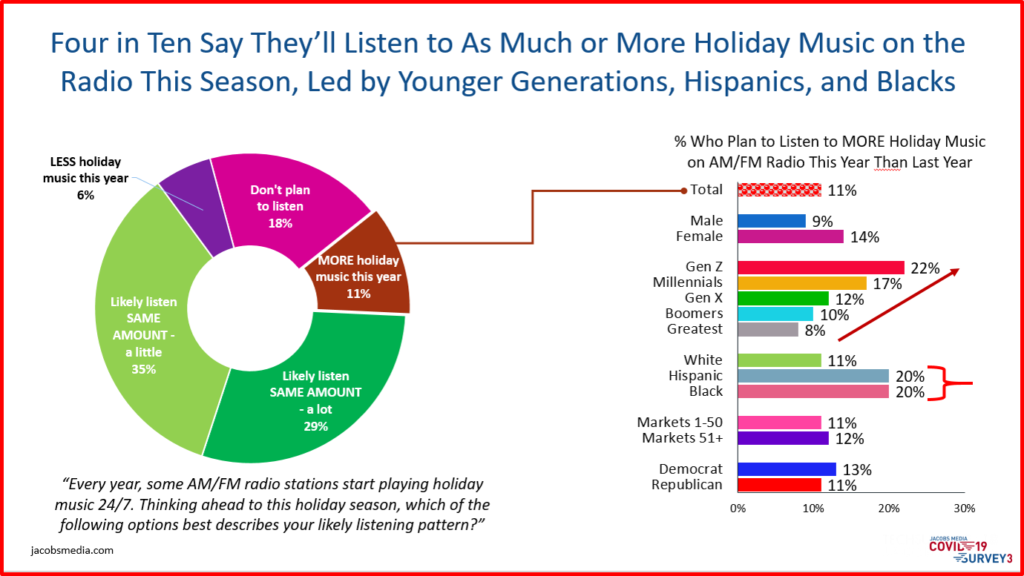
That would suggest a pretty strong showing in the Holiday Book that starts on Thursday.
Not surprisingly, hundreds of radio stations across the country – and around the world – “change formats” in the fourth quarter of each year, throwing out their normal music, and flipping over to a consensus list that ranges from Dean Martin to Whitney Houston to Mariah Carey. The numbers have averaged in the neighborhood of 450 stations in the U.S., likely to rise even higher this year. Nielsen’s Jon Miller told Inside Radio, “Each year it gets bigger.”
But why does Christmas music magically work every year? Is it just because Christmas is perhaps the most important holiday in the world, celebrated by more people than any other (besides ringing in the new year)? Or is it bigger than that?
Oddly enough, radio understands the mechanics of Christmas music. Every research company worth its salt has tested extensive libraries of holiday-themed music. Last month, Inside Radio published the list of most-played seasonal hits, thanks to the efforts of P1 Media Group and BDS Research/MRC Data. They scoured through the most played/most streamed songs from last year to compile their list.
That was the easy part.
By now, everyone knows the songs to play. But what about the emotional messaging that ought to accompany the playlist?
 That’s the question that’s never researched – WHY does Christmas music “print” so well – among people with wide-ranging demographics that transcend age, gender, and ethnicity?
That’s the question that’s never researched – WHY does Christmas music “print” so well – among people with wide-ranging demographics that transcend age, gender, and ethnicity?
And why is its impact growing these past few years?
Clearly, part of the phenomenon is a release for the anxiety so many of us have been feeling these past few years, no matter which side of the political and social end of the spectrum you occupy.
But the emotional underpinnings of this stunt phenomenon are rooted in nostalgia – pure and simple – a yearning for “the good old days.” Or better put, those magical holidays and family gatherings of years past.
A statement of the obvious? Maybe. But it’s never been about how the songs test and the order in which we play them.
It’s about how they make us feel.
It’s about returning to a kinder, gentler time – the Christmases people remember growing up. (Or that they idealize from holidays movies like It’s A Wonderful Life or Home Alone.)
It’s one of the reasons why all these songs work so well – they dredge up memories of the spirit of Christmas past. Like so many nostalgic memories, it becomes impossible to distinguish between whether these events of the past were wonderful or whether they are simply recalled so warmly or fondly.
No matter.
Christmas music works because it plays on the nostalgic memories that millions of us have, including many of us who celebrate the holiday more secularly than religiously.
And like memories indelibly etched in our souls, it has nothing to do with chronology and everything to with emotion.
When you calculate the average year of the top 40 songs on that safe list of Christmas smash hits list, it nets out to an absolutely prehistoric 1972. (A closer look at the titles show that many songs from the ’90s and newer are actually cover versions, including Michael Bublé’s songs and entries like Sinatra’s “Santa Claus Is Comin’ To Town” released in 1992).
And that tells you the blend of nostalgia and emotion is the rocket fuel that drives this radio phenomenon, and may even send it higher this year.
SiriusXM gets it. Below are email alerts or seasonal channels I received on consecutive days last week, each leveraging different decades of Christmas music nostalgia. Check out the copy. It leans heavily on those past Christmases and their dependable soundtracks. And note how each picks up wherever the other leaves off:
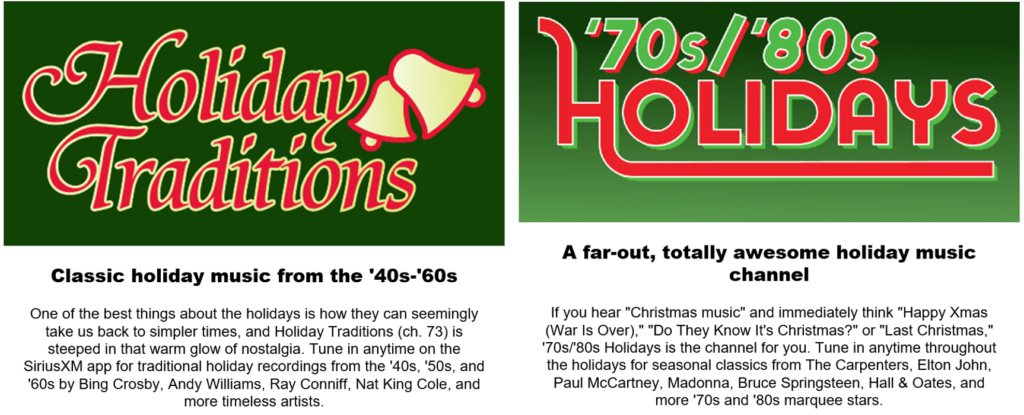
But perhaps it just doesn’t apply to songs about St. Nick. That’s because nostalgia runs hot all 12 months of the year – not just over the next four weeks.
Call me Mr. Obvious, but stations specializing in Burl, Brenda, and Bing this time of year don’t own the franchise on nostalgia or “the feels.”
Tomorrow, a possible antidote to Christmas music.
- The Exponential Value of Nurturing Radio Superfans - April 28, 2025
- What To Do If Your Radio Station Goes Through A Midlife Crisis - April 25, 2025
- A 2020 Lesson?It Could All Be Gone In A Flash - April 24, 2025




love your daily plug.After 55 years in radio I always find something truly insightful Thanks
Appreciate it, Mike.
Nostalgia is a huge reason.
Another is that it is the only format where everyone knows all the words to all the songs.
There’s a lot to be said for that, Mike. Thanks for commenting.
Isn’t the format really just Classic December or Holidays music?
Could there be an all holidays, all the time format out there somewhere?
I’m thinking that, yes.